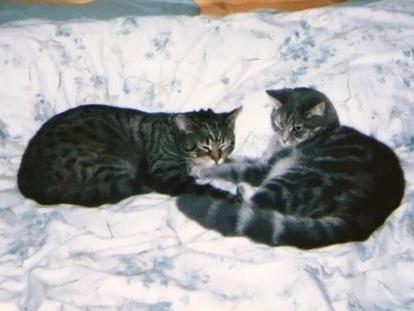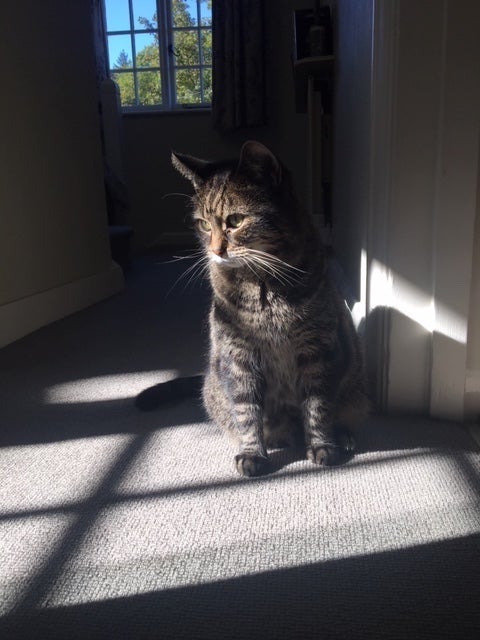The loss of a pet in these strange times is still keenly felt
In his latest reflection on place and pathway, Will Gore recalls how he pounded the streets, searching for his cat, who died this week


There are some bad reasons for buying a house. The pre-existence of a cat flap is one. Yet that was certainly a factor when we bought our first flat in 2005, a fairly dingy one-bedroom job in Clapham, south London.
We could, we figured, sort out the damp, take out the grim laminate flooring and repaint the orange and blue kitchen. But the cat flap (and the tiny garden to which it led) held out the promise of the pet we had longed for in the years we had lived in rented places.
Six months after we moved in, with repairs and renovations more or less complete, we set off to the Celia Hammond animal rescue centre, where we fell for a sturdy, tough looking mog and her kitten, a grey tabby, who sneezed repeatedly.
Little did we know what we had let ourselves in for. For one thing, there was no hint of a familial bond between the animals; Emmeline, the mother, was prone to attack her daughter, Clemmie, at any opportunity. She’d go for us too given half a chance.
One day she came in through the cat flap and we saw that she had suffered a rectal prolapse. It happened several more times over the next few months. Each time, we would put her into her basket and walk to the vets, 20 minutes away (we had no car in those days). We saw them so often we became quite pally.
Eventually, a major operation was required. We put aside thoughts of a fancy holiday and kicked ourselves for not getting pet insurance. First time round, it didn’t work; the specialist agreed to do it again for the price of the drugs alone, and everything went well. Emmeline survived, against the odds.
Still, she remained angry with life, barrelling in and out of the cat flap, hissing at Clemmie. She became a talented hunter; they both did. Mice were brought in regularly, sometimes escaping, other times losing their heads.
In these days of social distancing we could not be with her in those very final moments at the vets. But we buried her in the garden, beneath some lemon balm
One morning she failed to appear. By the evening, there was still no sign and we began to worry. Wandsworth Common was little more than a hundred yards away, with a busy road in between; and there were any number of sheds and other small outbuildings in the gardens beyond ours.
I called her from the garden, feeling like a pillock as I shouted “Emmeline” into the air of crowded suburbia. No cat appeared.
Later, with a feeling of dread, I set out to check our road and the neighbouring streets, all of which ran parallel to one another, between Wandsworth and Clapham Commons. I peered beneath parked cars and made those little kissy noises that all pet owners find themselves making when trying to attract their animal’s attention.

At the bottom of the street, where a busy high street intersected with the residential roads, all was abuzz; people in suits getting together for drinks and fun after work. I turned away, back up our road to the edge of Wandsworth Common, where dog walkers prowled and trees loomed in the dark. There was no cat there, dead or alive.
On into the next street, where the houses backed onto ours, and more soft, high-pitched calls for “Emmeline”, like I was some sort of confused choirboy. And then suddenly, there was movement by someone’s side gate; and there, rushing towards me, was our dear puss, purring delightedly.
I gathered her up in my arms and walked back up the street, past some bemused children playing outside, along the common’s edge once again, worried lest Emmeline be startled by the traffic or the dogs. At our door, she nearly kicked me backwards in her desperation to be inside. For once, she was glad to be home. Against the odds, she survived.
It wasn’t the last time she left us; it wasn’t the last time I walked the streets to find her. I wondered at the time if was a foretaste of parenthood. Not yet; but we’ll see.
When we moved out of the capital, Emmeline became a happier cat, with more room to wander – inside and out. She had a scrape with a car at least once, and came in with a dislocated shoulder on another occasion. She never quite loved her daughter; but she was less vicious in her beatings. Through it all, she survived.
Until last Wednesday. After three weeks of barely eating, and a tentative diagnosis of oesophageal cancer, we decided that her time, and her many lives, were up.
In these days of social distancing we could not be with her in those very final moments at the vets. But we buried her in the garden, beneath some lemon balm. Her loss is a minor one in the grand scheme of things; yet we feel it nonetheless. And we remember how she loved to roam; and those times we roamed to find her.
Join our commenting forum
Join thought-provoking conversations, follow other Independent readers and see their replies
Comments